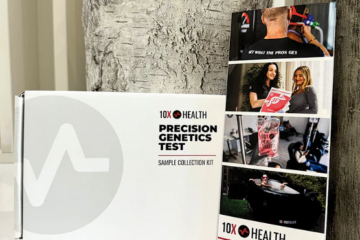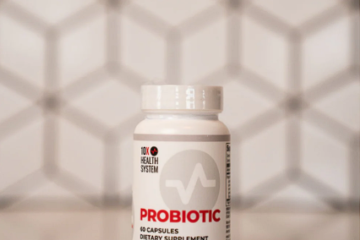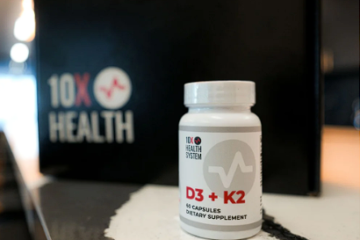The 10X Health Genetic Test is designed to give personalized health insights based on your genetic makeup. This test focuses on five key genes—MTHFR, COMT, MTR, MTRR, and AHCY—each of which plays a role in nutrient metabolism, detoxification, and methylation processes. By identifying potential mutations in these genes, 10X Health aims to help users optimize their diet, supplementation, and lifestyle. Impact-Site-Verification: undefined

Key Features of the 10X Health Genetic Test:
- Focus on Methylation Pathways: The test looks at how efficiently your body processes nutrients and detoxifies, focusing on genes involved in the methylation cycle, a key biochemical process.
- Tailored Recommendations: Based on your results, you’ll receive diet and supplement suggestions that align with your genetic profile to improve energy levels, mental clarity, and overall wellness.
- Simple At-Home Test: The test is conducted using a cheek swab that you can complete at home, providing a non-invasive way to assess your genetic predispositions.
Genes Analyzed in the 10X Health Genetic Test
Understanding the roles of the genes analyzed by the 10X Health Genetic Test will give you a clearer idea of how this test could help optimize your health:
1. MTHFR (Methylenetetrahydrofolate Reductase)
The MTHFR gene is critical for converting folate (vitamin B9) into its active form, which is necessary for detoxification and reducing homocysteine levels. Mutations in this gene can lead to issues with folate metabolism, resulting in elevated homocysteine levels, which are linked to cardiovascular diseases, anxiety, and other health concerns.
- Common mutation impacts: Elevated homocysteine levels, fatigue, depression, anxiety, cardiovascular risk.
2. COMT (Catechol-O-Methyltransferase)
The COMT gene helps regulate the breakdown of neurotransmitters like dopamine and norepinephrine, which influence mood, cognition, and stress response. Variants in this gene can lead to an overaccumulation of stress-related neurotransmitters, which may affect emotional regulation.
- Common mutation impacts: Heightened stress sensitivity, mood swings, and anxiety.
3. MTR (Methionine Synthase)
MTR is vital for the conversion of homocysteine into methionine, an amino acid essential for DNA synthesis and repair. Methionine also plays a role in methylation, a process necessary for many biochemical reactions.
- Common mutation impacts: Higher homocysteine levels, nutrient deficiencies, impaired methylation.
4. MTRR (Methionine Synthase Reductase)
The MTRR gene works alongside MTR to regenerate methionine synthase, ensuring the methylation cycle continues smoothly. Disruptions in this gene’s function can lead to inefficiencies in homocysteine processing, exacerbating the effects of MTR mutations.
- Common mutation impacts: Inefficient methylation, increased homocysteine, cardiovascular issues.
5. AHCY (Adenosylhomocysteinase)
The AHCY gene plays a role in converting S-adenosylhomocysteine into homocysteine, which is a critical part of the methylation cycle. Mutations in AHCY can lead to homocysteine accumulation, affecting liver function and increasing the risk of cardiovascular diseases.
- Common mutation impacts: Liver problems, methylation inefficiencies, elevated homocysteine.
Grant Cardone on the 10X Health Genetic Test
Entrepreneur Grant Cardone has publicly endorsed the 10X Health Genetic Test, emphasizing how it helped transform his health. He shared that after years of chronic pain, anxiety, and stress, this genetic test enabled him to optimize his wellness. At 64 years old, Cardone claims to be in the best shape of his life, free from daily pain, and performing better than ever. He believes that by identifying and addressing genetic deficiencies, anyone can improve their health and overall quality of life.

Pros and Cons
Pros:
- Personalized health insights: By identifying genetic mutations, the test offers actionable advice tailored to your body’s specific needs.
- Improves nutrient management: The test highlights how your body processes essential vitamins and minerals, helping to optimize diet and supplement plans.
- Convenient and non-invasive: Simple at-home testing with a cheek swab and results delivered digitally.
Cons:
- Limited gene coverage: The test only analyzes five genes, which limits the scope of insights compared to other genetic tests that cover hundreds or thousands of genetic markers.
- Cost: At $599, the test is on the pricier side given the limited number of genes analyzed.
- Customer service issues: Some users have reported delays in receiving results and difficulties with scheduling follow-up consultations.
Who Should Consider the 10X Health Genetic Test?
The 10X Health Genetic Test is ideal for individuals seeking to optimize their health through personalized diet, supplement, and lifestyle recommendations. It may be particularly useful for those who:
- Experience nutrient deficiencies despite a healthy diet.
- Suffer from chronic stress, anxiety, or mood disorders.
- Want to address cardiovascular risk by managing homocysteine levels.
However, if you are looking for a more comprehensive genetic analysis, including ancestry and broader health markers, other tests like 23andMe or SelfDecode may offer a wider range of insights.

FAQs
1. How long does it take to get results?
Typically, results are available in 3-4 weeks, but some users have reported delays.
2. What genetic mutations does this test analyze?
The test identifies mutations in five key genes—MTHFR, COMT, MTR, MTRR, and AHCY—related to methylation and nutrient metabolism.
3. Is the test covered by insurance?
No, the 10X Health Genetic Test is generally not covered by insurance.
4. Can this test help improve mental health?
Yes, by identifying mutations that impact neurotransmitter breakdown (like COMT), the test can offer insights that help tailor interventions for better stress resilience and mental health.
5. How does the 10X Health Test differ from 23andMe?
The 10X Health Test focuses specifically on five genes related to methylation and nutrient metabolism, while 23andMe provides a broader genetic profile covering health, traits, and ancestry markers.


